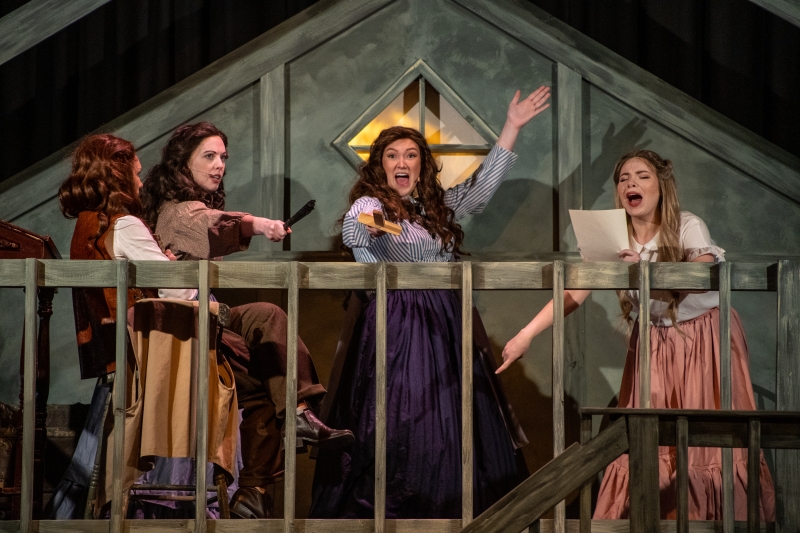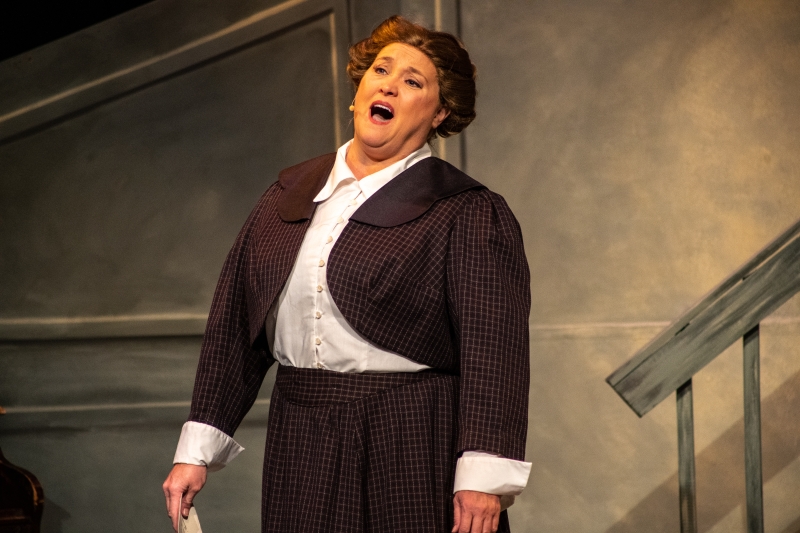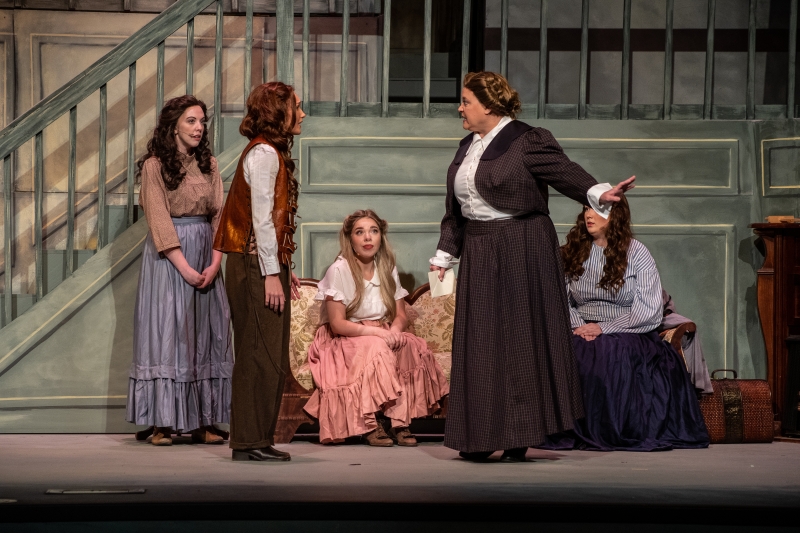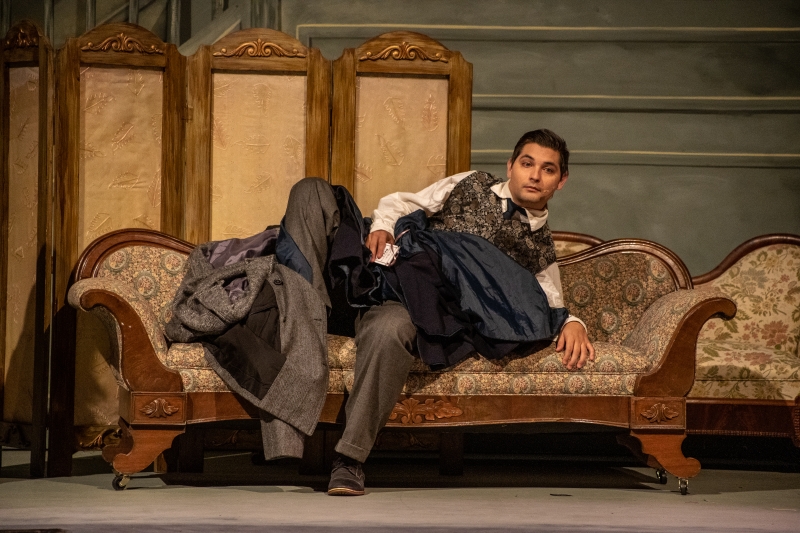Review: Watershed Public Theatre's 'Nostalgic and Sentimental' LITTLE WOMEN THE MUSICAL
Nashville favorite Kay Ayers Leads Stellar Cast in Director Cammy Harris' Staging

in Watershed Public Theatre's Little Women The Musical.
Louisa May Alcott's semi-autobiographical 1868 novel Little Women - the story of four sisters set in Civil War-era Concord, Massachusetts - is one of the most widely read and most beloved books of all time and so it is perhaps surprising that it was not until 2001 that it finally became a stage musical. But it wasn't until 2005 that Little Women The Musical (with music by Jason Howland, lyrics by Mindi Dickstein and book by Allan Knee) made its Broadway debut.
While the show ran for just 137 official performances (preceded by 55 previews) on the main stem, it has since found its footing as a popular title for community, academic and regional productions throughout the country, ensuring that Alcott's iconic March sisters continue to be revered and emulated and known to an even wider audience.

With a stellar cast under the direction of Cammy Harris, Watershed Public Theatre's version of Little Women The Musical ends its two-weekend run at Columbia State Community College's Cherry Theatre on Sunday, October 9, with an endearing production that proves once more the timelessness of Alcott's source material and the relevance of her memorable characters and provides an ideal diversion from the rigors of the real world of the 21st century.
Led by longtime Nashville theater favorite Kay Ayers, who delivers a luminous performance as Marmee, the matriarch of the March family (we don't care what Aunt March might have to say about that pronouncement), Harris' talented ensemble brings the characters to life with vigor and a very real sense of sisterly camaraderie that permeates the proceedings and ensure that audiences are captivated by the sentimental and nostalgic tale.
Afficionados of the novel may lament some of the fondly recalled scenes and incidents that aren't included in the stage musical, but they should find much to love about Knee's book. Little Women The Musical doesn't necessarily break any new ground or shatter any archetypes that are firmly ensconced in the canon of American musical theater, but the familiarity of the characters and those scenes that reverberate so vividly in the memory after reading the book remain steadfastly loyal to its literature.
.jpeg)
and McKenna Steel,
And it is perhaps that which failed to win over Broadway audiences: there are no glitzy musical numbers or onstage technical wizardry. Instead, there is the story of familial love and fidelity set against the backdrop of the Civil War, at a time in which American life was ever-changing, that seems to resonate most deeply with audiences.
Yet, like Alcott's book, Little Women The Musical focuses on the interrelationships of the four March sisters - the traditional 19th century first-born Meg, aspiring and ambitious author Jo, sweetly shy and musical Beth and the headstrong, petulant artist Amy - who are portrayed as honest, caring and devoted young women during tumultuous times. In order to remain true to the novel, their stories are told in a series of vignettes that sometimes make short shrift of events created by Alcott in her book while somehow retaining the novel's overarching, melodramatic tone that has endeared it to readers for more than 150 years.
Jason Howland's musical score (musical director Cheri Hughes and her musicians - who are sequestered offstage right - perform the score with equal parts professionalism and artistry) has a certain, indefinably timeless feel that is perfect for the world created in both the novel and the musical: while the music isn't exactly of the period in which both are set, it nonetheless seems to capture the feeling that is certain to evoke an emotional response. To that end, Ayers' exquisite interpretations of Act One's "Here Alone" and the second act's "Days of Plenty" perfectly encapsulate the themes found in Alcott's work. Ayers exudes maternal warmth throughout, providing the family with its loving heart and touchstone.

Kay Ayers and McKenna Steel.
As Marmee's four daughters, Harris has cast an exceptional quartet of young actors who brings their roles to life with aplomb: Jessica Fonville is wonderful as Jo, upon whose shoulders rest much of the play's exposition and conflict. Even while Fonville's Jo is sometimes strident and overbearing, she is also resolutely forthright and engaging. Her impressive performance of the Act One finale, "Astonishing," gives audiences the perfect segue into an intermission that forewhadows of so much more to come - for every member of the March family, but particularly for Jo - in Act Two.
Hallie Long is heartbreakingly genuine as the sweetly evocative and ultimately tragic Beth, whose duet with Jo in the second act - "Some Things Are Meant to Be" - is heartfelt and emotional. I happily admit to becoming teary-eyed during that song, but I should probably tell you that her duet with Mr. Laurence (played by Mark Henderson) on "Off to Massachusetts" had an equally expressive pull on my emotions in Act One.
McKenna Steel gives a strong performance as Meg, proving her the equal to each of the sisters in a role that sometimes seem overshadowed by the showier aspects of the other more florid characters. Steel's Meg is refreshingly self-assured and confident, and her onstage chemistry with Tyler Worden's John Brooke is palpable, particularly during their duet of "More Than I Am."
As should be expected, Jaclyn Wood's Amy very nearly steals the scene at every turn (Amy seems less perfect than her sisters and is therefore more accessible to most audience members) and effortlessly shows us her character's evolution from a somewhat annoying child to a poised young woman in the course of two-and-one-half hours.

Bradley Cusack is well-suited to the role of "Laurie" Laurence, the stereotypical boy-next-door who becomes an honorary brother to the four sisters (although the show's book does him no favors in developing his character), ultimately falling in love with Jo only to have his heart broken and then marrying Amy during their European sojourn with Aunt March. "Take a Chance on Me," Laurie's Act One plea to Jo, is requisitely charming, while his reprise is heartrending, while his duet with Wood's Amy on "The Most Amazing Thing" is lovely.
J.R. Knowles plays the exasperation of German-born Professor Bhaer with ease and his onstage to connection to Fonville as the plot progresses is well-played and convincing, leading to the altogether romantic nature of "Small Umbrella in the Rain."
Finally, as the redoubtable Aunt March, Deb Meeks delivers a brash performance as the wealthy March family relation. Oftentimes demanding, Meeks' Aunt March commands the family with as much presence as the stage will allow.
Morgan Matens' scenic design provides an appropriate backdrop for the musical, with lighting design by Eva Orman-Garrett.
Little Women The Musical. Book by Allan Knee. Music by Jason Howland. Lyrics by Mindi Dickstein. Based on the novel by Louisa May Alcott. Directed by Cammy Harris. Stage managed by Susan Gaw and DeAnna Parker. Presented by Watershed Public Theatre. At Cherry Theatre, Columbia State Community College, Columbia. Through October 9. For details, call (931) 797-6551. Running time: 2 hours, 45 minutes (with one 15-minute intermission).
Reader Reviews
Videos

